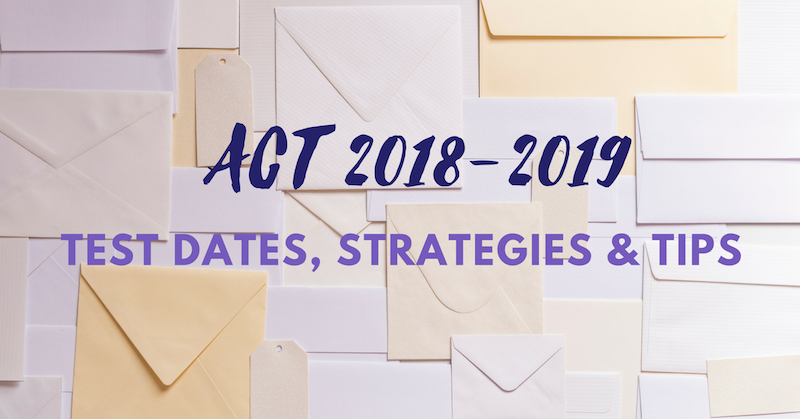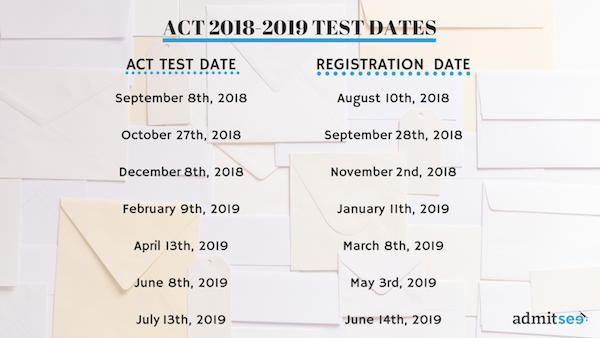Ready to take the ACT Test? Here’s everything you need to know from studying strategies to ACT 2018-2019 test dates:

Study Duration & Strategy
Most students typically take the ACT Test some time during the junior year. We recommend you take it fall of your junior year so you have the summer between sophomore and junior year to study for the test. Plus, this also gives you the opportunity to retake the test if you really need to throughout junior year.
More importantly, taking the ACT early frees up time for you to work on your college, scholarship and financial aid applications. Don’t underestimate how busy you’ll be in your senior year. You will still have to focus on your senior course work too, so whatever you can get done early, you should!
We don’t encourage students to take it earlier than the end of their sophomore year. There is a lot of material you simply won’t have covered yet, which will end up making your study time longer. Here are tips on how to prepare for the ACT:
1. Learn about the ACT Test
It seems silly but this is a really important step that a lot of students skip. Don’t just dive straight into studying or taking a practice test. You need to first understand how the test is structured, how much time you have, and what the different sections are. If you walk into a test blind, you’re more likely to be stunted by the unexpected. Manage your own expectations for the ACT exam.
The ACT test has four mandatory multiple-choice sections and an optional fifth writing section. The order of the sections are always the same:
English: 75 questions. 45 minutes.
Math: 60 questions. 60 minutes.
Reading: 40 questions. 35 minutes.
Science: 40 questions. 35 minutes.
Writing (Optional): 1 prompt. 40 minutes
Total test time without writing section: 2 hours and 55 minutes
Total test time with writing section: 3 hours and 35 minutes
For a further breakdown of the test and what to expect from each section, check out Magoosh’s free ACT ebook. It’ll give you an in-depth understanding of the test and what to expect.
2. Take a Practice Test
Once you know what the ACT test is all about, it’s time to sit down for a real practice test. Don’t worry about studying beforehand. The point of this diagnostic test is to see what level you are already at, so you can adjust your ACT study plan. A student who scores a 28 and 32 on their first practice test will have very different study plans, so it’s important to take this and tailor your studying to what you need.
Don’t worry too much about your first ACT practice score. If you did well, you can relax a little, but don’t let yourself think you don’t need any studying. If you didn’t score too well, it’s okay! After all, you haven’t started studying at all. You just need to know what your starting point is.
3. College Research & Target Score
Start looking into the colleges you may be interested in applying to. Don’t run straight to the US news rankings. Ask yourself some key questions first:
What are you currently interested in? What do you enjoy doing?
What is your favorite subject right now? What about it do you like?
What is your family’s financial background? How much can you pay in tuition?
It’s your first day of class. You walk into the classroom. Where do you sit?
These are just a few to help you start really thinking about what you might be looking for in college. Instead of just thinking about a particular major you might want to study, think bigger and consider what type of career you might want. This comes from more than just what subject you’re good at or you like. It’s everything else you are interested in doing—team sports, leading a project, problem solving, meeting new people, etc. If you’re a rising junior, keep in mind that the answers to these questions might be drastically different by the end of your junior year. And that’s okay! You are still finding out what you are interested in and who you are.
Based on the answers to the questions, start looking for the colleges that share those values or have the academic programs that offer what you’d pursue. Take a look at what the average ACT scores are at those universities to discover what your ACT target score should be.
4. Find Out How Many Study Hours You Need
This will depend on what your first ACT practice score was and what your ACT target score is. How many points are you looking to improve? In general, here is the number of study hours you may need:
1-2 point improvement: 20 hours
2-4 point improvement: 40 hours
4-6 point improvement: 80 hours
6-9 point improvement: 150 hours+
What you will be focusing during these hours will depend on what your starting point is. If you already have a 32, and you are looking to aim for a 33 or 34, then your focus will be largely on your test taking skills and doing practice tests to see what you’re struggling with: time, specific knowledge areas, or strategy.
5. Choose Your ACT Test Date

**There’s also a July 14th, 2018 ACT Test Date this summer! Register by June 15th, 2018 if you think you’ll be ready by then. Unfortunately, this test date is not available in New York or California.
Look at the ACT Test Dates available. If you started studying now, when would you be ready to take the test? Be realistic about this. You know by now how many hours you need to get to your target score. Will you be studying over the summer? Do you have a part-time job? Are you going to summer school? Similarly, if you’re studying during the school year, think about how many hours you can really dedicate to studying for the ACT while also doing your school work.
Register for your ACT Test Date! Create a schedule and have someone keep you accountable. Need to improve your score on SAT or ACT? Get 10% off AdmitSee’s recommended test prep, Magoosh, with the promo code AdmitSee10.
Still have more questions about the ACT? Here are answers to the most frequently asked questions on standardized testing.
Applying this year? For access to our college profiles, upgrade to our premium plans offer different levels of profile access and data insights that can help you get into your dream school.
















 Back
Back